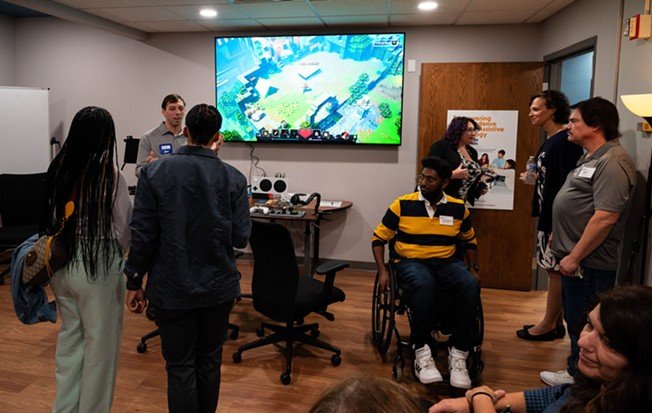The Inglis Innovation Center recently put down roots in Bellevue. Inglis may be a new name to many in Greater Pittsburgh, but it has been an established home care company for those with disabilities in Philadelphia for the last 100 years.
Inglis is run by the indefatigable Leah Marmo. Marmo gave Pittsburgh City Paper a tour of its new office space complete with a fully accessible kitchenette, a 3D printing room, a conference room, and more. Marmo has been hard at work getting the center off the ground over the past year.
She tells City Paper that they were looking to expand outside of the Philadelphia region when Highmark approached them. Highmark was impressed by their innovation space and interested in creating something similar in Pittsburgh. Inglis leadership along with Marmo (and her insights) wrote a grant proposal, and 15 months later, Marmo was able to bring the Innovation Center to Bellevue — conveniently for Marmo, the new location is walking distance from her home, she tells CP with a laugh.
“The Innovation Center…that we opened is really the launching pad for two services that we offer right now. One of those services is our community-based assistive technology program, Inglis Assistive Tech Solutions (IATS), and the other program is called the Inglis Impact Accelerator,” Marmo explains.
The community-based assistive technology program provides services such as creating custom-made assistive technology products for people in the region. In one instance, a community member, following a tour of the Center, connected her mother who lives with multiple sclerosis to the Center’s assistive tech programming. The program was able to provide custom 3D printed tools, such as a bottle opener and a holder for her phone, that supports the woman with her activities of daily living.
Jeffrey Ruffing, an assistive technology development specialist with the Inglis Innovation Center, collaborates with volunteer groups throughout the world who can assist with the 3D modeling necessary for 3D printing of customized AT. Once someone has created a 3D model, they share it with Jeffrey, who can click a couple of buttons and have the customized item printed in a matter of days.
The Center’s Impact Accelerator is a unique program for aspiring business owners in the disability inclusion and accessibility space. The accelerator is open to businesses with impactful ideas related to assistive technology, affordable accessible housing, and innovative healthcare solutions.
“We were looking at both individuals who identify as having disabilities with really great ideas, and companies who didn’t necessarily have to identify as having disabilities, but what they were creating was for the community itself,” Ruffing tells CP. “So we sent out a call for applications in January this past year, and that was across the State of Pennsylvania. We had about 18 companies apply to the program, and through a really rigorous selection process, we selected five of those companies. It turned out that all five were from the Pittsburgh area, which was lucky for us.”
Each company gets $5,000 just for being selected into the cohort. The accelerator teaches the “fundamental basics of business development to the companies and walks them through really key components of what it means to start and run a business, and then how to scale that business.”
At the end of the 15-week program, they give their business pitches. Anyone is allowed to attend their final pitch and the company who wins the “popular vote” (i.e. “The People’s Choice Awards”) gets an extra $5,000.
The winner of the popular vote this year was Cookie Cookie Ice Cream. Companies such as Alex Geht’s TestaSeat, Jennifer Price’s Dime Network TV, Ty Allen’s Unity Concord Real Estate, Cookie Cookie Ice Cream, and Robert Breen’s River City Growers were all in the latest cohort.
As for why the business accelerator focuses on disability, Ruffing explains that there are fewer grants available for research focused on assistive technology (AT), which means there are fewer researchers able to put the time and effort into creating much needed assistive technology.
The lack of research means that there are fewer researchers able to take a product from the research lab to the marketplace. Additionally, founders with disabilities are less likely to receive resources and access to capital as their non-disabled counterparts.
“Our Accelerator highlights the strengths of founders with disabilities and showcases their competitive advantage. We not only want founders with disabilities at the table, we want to create a world where they own the table to begin with,” Marmo says.
When it comes to the future of assistive technology, Marmo notes, “There are two markets, really. The disability community is currently untapped when it comes to technology available to them and innovations to better serve them. There’s a lot of opportunity in tailoring innovations for this community based on user input and feedback.”
“Additionally,” she says, “the older adult community is expanding, especially in Pennsylvania. We see potential in both markets with different, but similar, needs that innovation can address, especially when innovation is co-created and co-designed alongside the community.”













